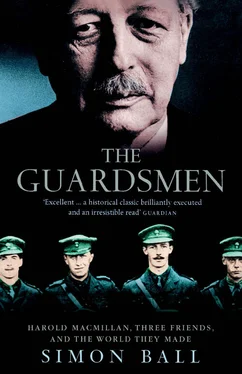1 ...7 8 9 11 12 13 ...32 Although by the summer of 1914 the future was beginning to be limned, – Lyttleton would be a lawyer, Cranborne would be a lord, Macmillan would be a gentleman publisher – the four were still little more than interested observers of the scene. Their hopes and interests reflected very accurately their position in society. They did not lack talent but none of them was outstanding. If the example of others, grandfathers, fathers and brothers, brought this home to them they nevertheless had a high opinion of themselves. They had a fund of impressions and sometimes inchoate opinions. They were, in a word, undergraduates, and typical of the breed. As Lyttelton himself later put it: ‘At the University I merely became social and an educated flâneur. It was the camp and the Army that turned me into a case-hardened man.’ 73 The fact that one in four of those who were at Oxford and Cambridge at the same time as this quartet were to be killed in the Great War should not lead us to over-dramatize their pre-war experience. They had not ‘grown up in a society which was half in love with death’. They would have been surprised to have been told that ‘they were afflicted with the romantic fatalism that characterized that apocalyptic age’. 74 The picture of a golden but doomed generation is an ex post facto invention.
To serve in the Guards was to have a very specific experience of the war. They were socially élitist, officered by aristocrats or by those who aspired to be like aristocrats. They were also a combat élite. Robert Graves reported the view that the British army in France was divided into three equal parts: units that were always reliable, units that were usually reliable and unreliable units. 1 The Guards were on his ‘always reliable’ list. They were introverted, especially so once an entire Guards division was created in 1915. A junior officer would rarely ever come into contact with a senior officer who was himself not a Guardsman. They had an unshakeable esprit de corps. They were envied by other units. James Stuart, Cranborne and Macmillan’s brother-in-law, who served with the Royal Scots, remembered that ‘the Guards were always regarded by the Regiments of the Line as spoilt darlings’. 2
All this mattered. Although the experience of war was one of terrifying loneliness, to succeed one had to be part of a successful team. Seen from a distance, the industrialized slaughter of the Great War seemed to submerge the individual in the mass. Yet this was not the experience of the young officers. The mass was very distant: the platoon, the company, the battalion and especially the battalion officers were the points of reference that mattered. Combatants faced the terror of ‘men against fire’: caught in an artillery barrage or enfiladed by machine-guns, it did not matter whether a man was the best or worst soldier – survival was purely a matter of luck. Yet on other occasions success in close-quarters fighting rested on skill, strength and the will to prevail.
It mattered what one did and with whom. It also mattered when one joined the army. Those undergraduates who volunteered in 1914 reached the front in 1915. Although they were part of the process by which the army transformed itself from a small professional force into a ‘people’s army’, those in the Guards were inoculated against this experience. Many ‘hostilities only’ officers entered the Guards regiments, but ‘dilution’ was strictly limited: the Grenadier Guards had doubled in size from two to four battalions by 1915, but the process went no further for the rest of the war. The new Guards officers were, however, not insulated from the battles of 1915 and 1916. It was in these battles that the army grappled with the problem of how to fight a modern war. It was a bitter experience. Casualties were very high. Nearly 15 per cent of those officers who fought in the battles of 1915 died, nearly one quarter were wounded. Well over one quarter of those who had joined up from Oxford and Cambridge at the start of the war died. 3 This cohort’s career as regimental infantry officers was effectively over by the end of the battle of the Somme in 1916.
The horrors of the Western Front were not, as it happened, at the forefront of the minds of four patriotic undergraduates in the first months of the war. Their anxieties were more about their social position in the struggle. Cranborne and Lyttelton had, as usual, a head start because of their connections. Cranborne’s father had a proprietary interest in the 4th Battalion of the Bedfordshire Regiment, which he himself had taken to South Africa to fight in the Boer War. Salisbury had promised Alfred Lyttelton on his deathbed that he would watch out for Oliver’s interests. He promised to fix commissions for his son and his ward as soon as possible. Little over a week after the outbreak of the war, Lyttelton and Cranborne handed in their applications for a commission. 4 Cranborne invited Lyttelton and another friend, Arthur Penn, to Hatfield to await their call-up. 5 They whiled away their time with shotguns. The juxtaposition of a shooting party as the preliminary to a war later caused them some grim amusement. Penn, invalided home, having been shot in both legs, wrote up his own game book as, ‘BEAT – Cour de l’Avoué: BAG – Self’. 6
Despite Lord Salisbury’s patronage, the trio remained fearful that they would become trapped in the wrong part of the military machine. ‘We are having trouble about our commissions,’ Lyttelton wrote anxiously. ‘The War Office, gazetted six officers, all complete outsiders, yesterday to the Regiment and none of us. The Regiment is furious because they loathe having outsiders naturally, we are angry because it seems possible that we may be gazetted to K[itchener]’s army.’ Salisbury made a personal visit to the War Office and ‘raised hell’. 7 The wait was made even more maddening for Lyttelton and Penn by Cranborne’s new-found enthusiasm for playing the mouth organ. 8
Salisbury was able to secure commissions for his son and his son’s friends. They joined their regiment at Harwich. It seems the trio had originally intended to stay with the Bedfordshires: Salisbury had hoped that the battalion would be sent overseas as a garrison or to France as a second-echelon formation. This plan was abandoned as soon as it became clear that reserve formations like the Bedfordshire militia would be cannibalized to provide manpower for fighting formations. Cranborne and Lyttelton had ambivalent feelings about not being posted to a line infantry battalion. ‘I am sorry because I must fight,’ Lyttelton wrote, ‘and I am glad…because I should rather dislike going into a regiment – probably a bad one – in which I know no one.’ 9 On 12 November 1914 their chances of going to France as part of a battalion disappeared: ‘it was the most tragic sight,’ in Lyttelton’s view, ‘seeing three hundred of our best men leaving for the front…without a single officer of their own’. 10 Rumours flew around the camp that the battalion would become little more than a training establishment. Lyttelton and Cranborne felt that any obligation they had had to stay with their regiment had been removed. Lord Salisbury had always kept up close links with the Guards, recruiting time-expired NCOs to provide the backbone of his own regiment. With this kind of backing it was relatively easy to effect a transfer. In December 1914 they were commissioned into the Grenadier Guards.
Although they were a little slower off the mark, Crookshank and Macmillan had similar experiences. Crookshank initially obtained a commission with the Hampshire Regiment. 11 Then a ‘course of instruction at Chelsea’ gave him ‘furiously to think, and made me decide for a transfer into the Grenadier Guards, in spite of arguments on the part of the 12 Hants and offer of a captaincy’. 12 While Lyttelton and Cranborne were at Harwich, Macmillan was at Southend with the King’s Royal Rifle Corps. He too saw that his battalion would be used as a training establishment. His later recollection tallies so closely with Lyttelton’s experience that it has the ring of truth. He hung on, but ‘after Christmas [1914] was over and my twenty-first birthday approaching, I began to lose heart’. As Lyttelton and Cranborne had turned to Lord Salisbury to use his influence, so Macmillan ‘naturally’ turned to his mother: ‘I was sent for and interviewed by…Sir Henry Streatfeild [the officer commanding the Grenadiers’ reserve battalion in London],’ Macmillan recalled. ‘It was all done by influence.’ 13 Sir Henry had become an old hand at dispensing these ‘favours’. It must have seemed that virtually every English family with social influence and a son of military age was beating a path to his door. 14
Читать дальше












